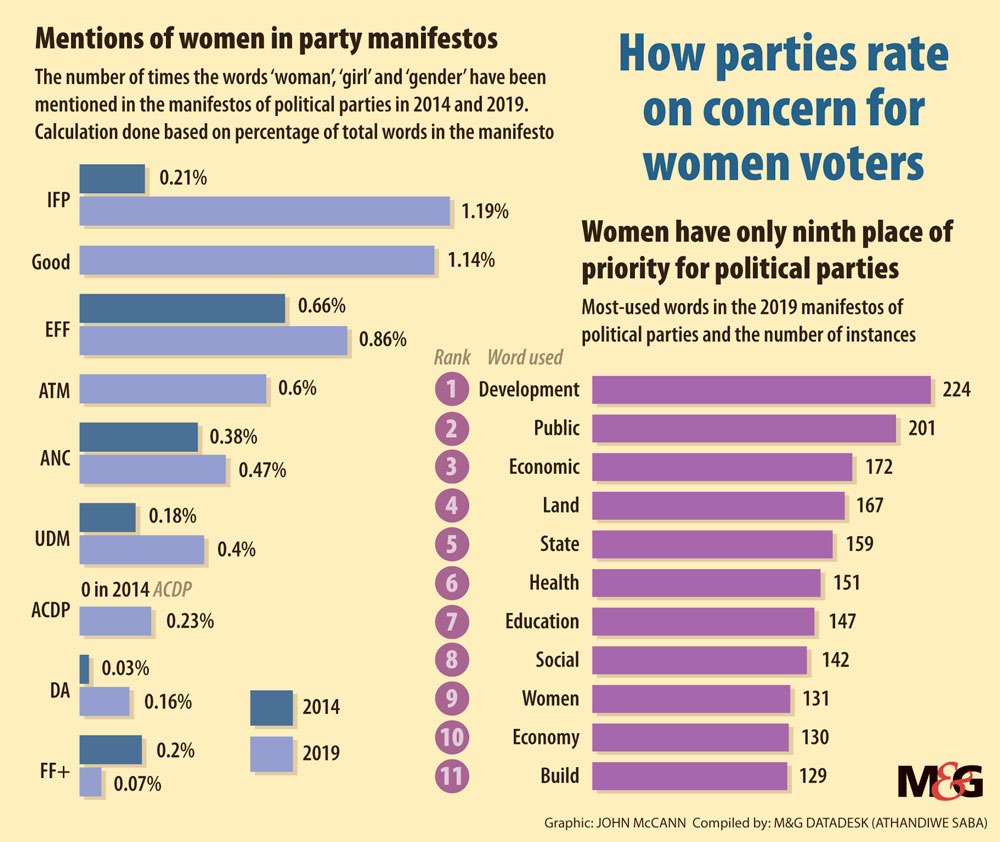Women wait for President Cyril Ramaphosa to address them in Alexandra (Oupa Nkosi)
More women than men register to vote and this trend has continued into 2019. And this year, political parties have significantly increased the amount of space given to gender issues in their election manifestos.
Of all the words repeated in the manifestos analysed by the Mail & Guardian, the word “woman” ranks in the top 10.
During the 2009 elections, women between the ages of 20 and 29 were the most registered. In 2014, there were about 2.5-million more women registered to vote than men (11.45-million men were registered), with women between the ages of 30 and 39 making up more than three million on the voter’s roll.
The M&G data team collected and analysed nine political parties’ manifestos, including those of the ANC, the Democratic Alliance, the Economic Freedom Fighters (EFF), the United Democratic Movement and the African Christian Democratic Party.
The manifestos showed that the word “woman” was mentioned 131 times in comparison with “development”, “public” and “land”, which were each mentioned more than 160 times by all the political parties combined.
The number of times the word “woman” was used has also increased compared with the national elections of 2014 in the manifestos of all political parties, except for the Freedom Front Plus.
The Inkatha Freedom Party and the newly formed Good party have, at 1.1%, the highest number of mentions of women. They were followed closely by the EFF. Although the party had the longest manifesto, it dedicated 0.86% to mentioning women.
Research conducted by the Centre for Social Development in Africa (CSDA) found that men were more likely to vote for the ANC than women. On Tuesday, the centre said its most recent survey reflected that this had changed.
Leila Patel, who led the research, released the second edition of the study, which was conducted in the fourth quarter of 2018. The survey found that there is no gender gap in voters’ preferences.
“Gender is not a predictor of who respondents are likely to vote for in this election,” Patel said.

She said that in 2016 women voters might have been influenced by the association of the ANC with its then president, Jacob Zuma, and his prosecution for rape, though he was acquitted, and some of his articulations about women.
“Women, like any other demographic, are rational voters. The change in 2016 for me was a watershed moment if you look at women’s support for the ANC since 1994. That showed that, under specific circumstances, women are willing to shift their vote to the opposition.
“Generally, the theory says that people make rational choices because they take their own interests into account. If this helps us understand this, it helps us understand women’s agency in decision-making,” said Patel.
Some of the women interviewed by the M&G believe no party is fighting for issues that affect them. Pozisa Mayekiso, 34, said she will not vote because none of the parties are deliberately addressing to her issues and the women in the parties are perpetuating an “oppressive” system.
“We, as a country, inherited a system that is oppressive to women. Women have always been seen as second-rate citizens to men. And, instead of us changing the system, we inherited it and continued with it. We have a system where women are subjected to men and don’t have their own agenda. It truly seems that women believe that the only [way] is to be ruled by a man,” she said.
Petunia Namanyane, who is from Pretoria, said she is changing her vote because of the increase in gender-based violence.
“As a woman, I don’t see what the political party I voted for has done for women’s issues. Instead, women are dying and being raped every day and so little has been done about it. It would not make sense for me to vote for the same party that does not see that as a problem,” she said.
According to the CSDA report, women who are grant beneficiaries are more likely to vote for the ANC because they fear losing it.
“We asked people whether they value democratic rights such as voting, access to courts and freedom of speech or socioeconomic wellbeing, which refers to meeting their basic household needs,” said Patel.
“According to our study, 58% will prioritise socioeconomic wellbeing while 27% will prioritise democratic rights.”
How we calculated
In the M&G Data Desk’s analysis, common words such as “is”, “this” and “the” were filtered out of the party manifestos. Other common words such as “South Africa” and “government” were also removed to avoid redundancy.
A search for the frequency of words such as “girl”, “girls”, “woman”, “women”, “female” and “gender” was used to indicate the overall reference to the specific topic. To determine each manifesto’s ratio of the topic (women, gender and girls), its total frequency was divided by the total frequency of all words. This is important because the length of the manifestos varies greatly.
Even though the percentage usage of each topic seems small, it is significant, relative to the other words in the manifesto. For instance, “land” is the topic mentioned most by the Inkatha Freedom Party, but it makes up only 1.02% of all other words; it is mentioned 12 times out of a total of 1 173 words.